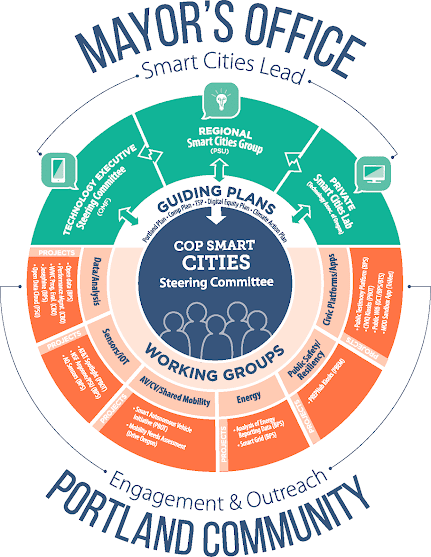Not *too* smart
A while back, an alert reader sent me a link to this story, about classic Portland City Hall bungling (or worse). This time, something called "Smart City PDX" sent out $3 million worth of prepaid U.S. Bank debit cards, in the early days of Covid craziness, to help some downtrodden people pay for internet access. The problem was, the cards could be used for anything, and the recipients were not held accountable, at all, for their use of the cards.
Each pre-paid debit card was preloaded with $364.45. Recipients of the debit cards pledged to use the money to pay for internet service but were not required to submit their name, receipts or other documentation of how funds were used.
Program designers admit once the prepaid debit cards were distributed, there was no way to monitor if, where or how they were used. It was no different than handing out $364 in cash....
KGW’s analysis of Smart City PDX records obtained through a public records request found the program had unequal distribution. More than 800 people received two or more prepaid debit cards. One person took home six cash cards, valued at more than $2,000. Another person got five debit cards, despite listing only four people in their household.
Okay, what did you expect? It's what happens when bureaucrats play with OPM (other people's money).
But just for kicks, I thought I'd take a further look at what "Smart City PDX" is, and what it's supposed to be doing. And my goodness, it's quite the cluster. I've surfed through a half dozen pages on their website, and I still can't make heads or tails of what they're up to besides burning through money. If you were trying to create a parody website to poke fun at bureaucratic excess, you could not outdo theirs. Just a sample:
Smart City PDX is partnering with the Portland community to make our city a place where data and technology are used to improve people’s lives, particularly in underserved communities. Together we'll proactively prepare for future technologies to promote community-driven goals and values. We'll use data and technology responsibly to support a healthy, safe, more affordable and prosperous Portland for everyone...
Motivation
The opportunities from technology advancements are not accessible by all. This is due to existing disparities and inequities based on race, socioeconomics, and ability. The City of Portland recognizes these inequities as major barriers to prosperity. The Priorities Framework sets a goal and criteria for centering and upholding equity in the Smart City PDX program.
Collaborative development
The Priorities Framework is a product of the City's Smart Cities Steering Committee. This committee involves 14 different bureaus and all five Commissioner's offices. Five bureaus and staff from Commissioner's offices led the framework effort, these included:
Bureau of Planning and Sustainability
Office for Community Technology
Office of Equity and Human Rights
Portland Bureau of Transportation
Bureau of Technology Services
Mayor Ted Wheeler’s Office
Commissioner Amanda Fritz's Office
Framework content
The Priorities Framework has two sections plus the Smart City PDX goal.
Section 1 outlines a process to guide decision making by City staff about data collection and Smart City PDX investments. Integrating community engagement of underserved populations into data collection efforts is vital.
Section 2 outlines criteria to vet and evaluate Smart City PDX projects, plans, and policies. The criteria help us integrate our values into decision-making processes. Improved allocation of public resources is also a benefit of the criteria.
The Smart City PDX equity-focused criteria “are a very well-thought out lens” for evaluating our Smart City PDX investments “that could be broadly applicable to the City’s work” said Mayor Ted Wheeler.
If you think you can penetrate the gibberish, take a look. I dare you.
I'm all for getting technology to poor people, even on the taxpayer's dime. But you have to wonder whether that is what is actually going on here. The "smart" label seems ironic.

It seems pretty straightforward to me.
ReplyDeleteBy tiering technological platforms to maximize accessibility, focused through an equity lens, market inequalities will be ameliorated. Data-driven strategies are tailored to maximize throughput of end-user realization of desired outcomes, informed by stakeholder priorities. This efforting will result in near-term reduction in existing gaps in accessible technological participation. Continued focus on enabling participation through incentivizing sustainable inputs at increased funding levels will empower individuals and socio-economic sectors to continue to incrementally leverage access to technological competencies and systems. This will require a massive influx of capital, at a level which is several multiples of current fiscal support.
Any questions?
Thanks for clearing that up.
DeleteWhat a bunch of gibberish techno babble.
DeleteThis is worst than an LSAT prompt.
ReplyDelete